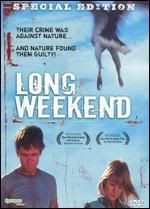
Due to cinema’s ongoing compulsion to cast nature as humankind's enemy, audiences have been bombarded in the last 50 years with a slew of environmental disaster films. Most of these films, which range from Alfred Hitchcock’s seminal The Birds to Roland Emmerich’s forgettable The Day after Tomorrow, fall like volcanic rock into the suspense genre. A scant few films, such as Michelangelo Antonioni's Red Desert, approach a philosophical genre that challenges humankind’s indifference to ecology. These films primarily concern themselves with ontological definitions of the “natural order” and send your average Joe running for the next twister picture. Colin Eggleston’s 1978 film Long Weekend, however, takes the unusual risk of dabbling in both genres. Unfortunately, it fails like a prayer against an Indonesian mudslide.
Set primarily in a thicket of woods near an Australian beach, Long Weekend tells the story of a bickering metropolitan couple who undergo the agony of camping. Surrounded by malicious woodland creatures, the couple fights for their lives, sanity, and -- ostensibly -- the sheer fun of it. As a suspense film, Long Weekend has it all wrong. It relies on sound effects that are no more chilling than a Halloween audiocassette. The creatures may be unusually malicious, but they are never more intimidating than (gasp!) a possum, a grass snake, a Jack Russell Terrier, and a sea cow. Eggleston anthropomorphizes to such a ridiculous degree that even the campfire wants our protagonists dead (yes, really). Even if the suspense weren’t cut by this idiocy, Jack Russell Terriers are not spooky, not even when they show their cute widdle teef.
But why do the creatures and the very elements themselves hate this couple so much? Because they had an abortion. “Their crime was against nature… and nature found them guilty!” the tagline reads. It could be argued that nature is pissed that the couple leaves a trail of brushfires, liquor bottles, and dead kangaroos in their wake, but at the heart of Long Weekend beats an abortion. The woman interprets a dying manatee’s cries in the night as the cries of her aborted child. In a rage, she smashes an eagle egg against a tree (symbolism!), and the man -- who has already killed a kangaroo, a manatee, and a chicken -- asks in his incongruous way, “Why in the name of God did you do that? It’s a living thing!” My problem with this rhetoric is not so much that it offends my personal convictions; my problem is that it’s ham-fisted and contradictory. Long Weekend clearly rejects the notion that all of nature falls underneath man’s dominion. The greatest threat to the ecological balance is humankind’s exponential population growth, so why should an abortion inspire such contempt amongst the birds and the bees? Don’t kid yourself. If animals had any concept of human abortion, they would root for it.
Long Weekend contradicts itself in one other significant way. Despite the fact that Eggleston critiques humankind’s inharmonious relationship with nature, he seems to suggest only that man and nature go their separate ways. Most of the protagonists’ problems could have been avoided if they had just stopped fucking with it -- it being the Jack Russell Terrier, the sea cow, the unborn child. In no way does Eggleston suggest a symbiotic method -- even a gesture -- that would help to realign the ecological balance. This is dangerous. Separation is the problem, not the solution. Until we accept the fact that we are indeed a part of nature, not its neighbor, we will continue to be haunted by possums and grass snakes for a long time to come.
If you’re curious about 1970s Australian film, you’d be much better off watching Nicolas Roeg’s Walkabout or Peter Weir’s Picnic at Hanging Rock. Those films incidentally explore themes that say much more about humankind’s relationship with the landscape, and they express their ideas with a subtlety that Long Weekend sadly lacks.
UPDATE, 2/27/08: Dex sez I invited Andrew to check out 'Long Weekend' for our inagural blog posts, so I mostly disagree with the Big A's review. In fact, I wrote a piece last semester for credit on the film. While I mess around with the template and try to figure out how to fold up long posts (suggestions welcome in the comments, yo), interested parties may check out my own take on the film and why it's totally awesome forever here and here.
2 comments:
i have a rather lengthy review i'd like to post in response. what say you?
Go for it. That's what this site is here for.
Post a Comment